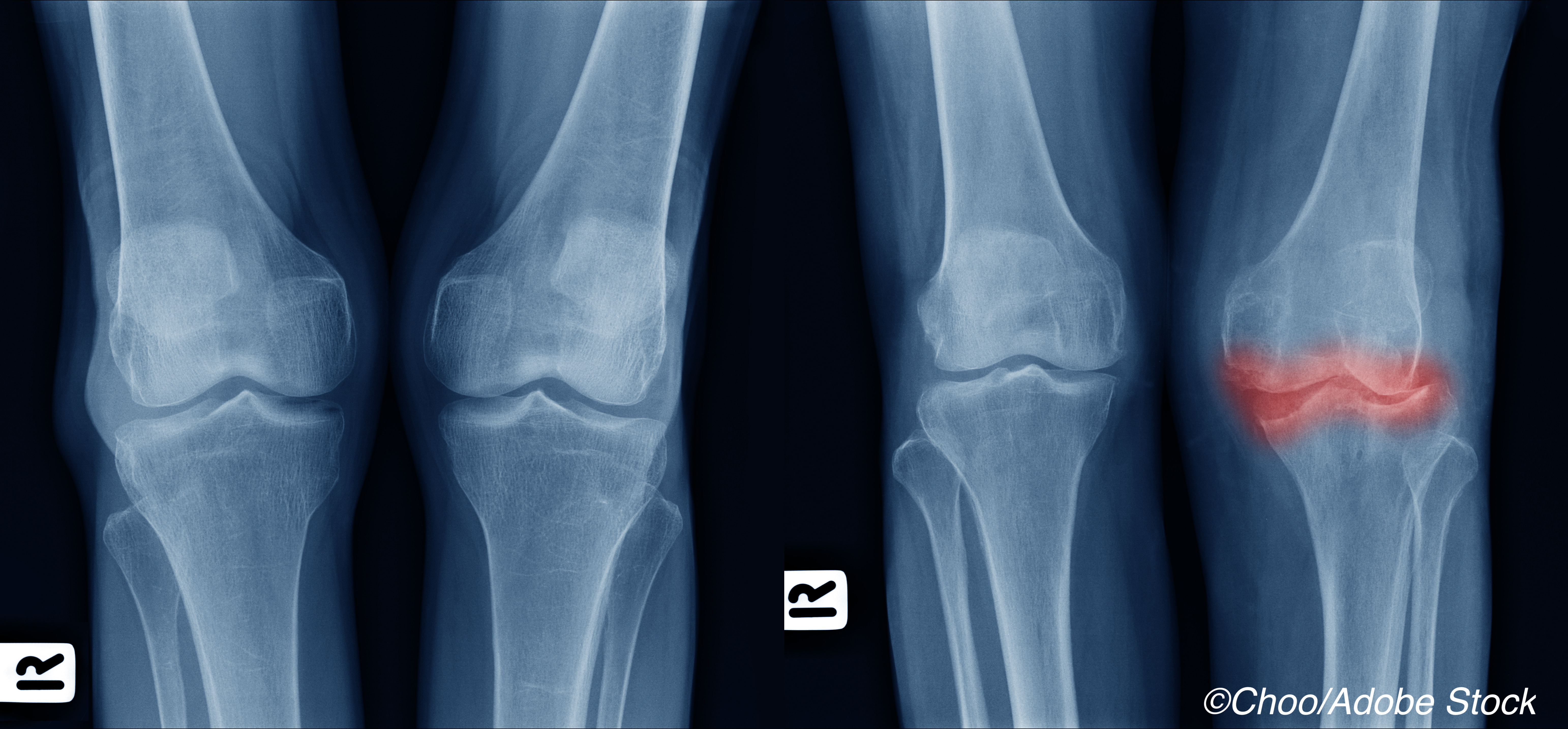Canakinumab shows promise in preventing the need for total hip or knee replacement (THR/TKR) and time to adverse events (AE) related to osteoarthritis. It may, therefore, merit further study, according to researchers of an exploratory analysis of the Canakinumab Anti-Inflammatory Thrombosis Outcomes Study (CANTOS), who published their results in the Annals of Internal Medicine.
“Because of demographic changes, the prevalence of osteoarthritis is steadily increasing, posing a substantial disease burden on global health care systems. Chronic joint inflammation is common in osteoarthritis, with a range of inflammatory mediators implicated in pain and structural progression. Interleukin-1 (IL-1) is a critical cytokine involved in the osteoarthritis inflammatory process. However, whether IL-1 inhibition has clinical efficacy in osteoarthritis is uncertain,” wrote senior author Paul M. Ridker, MD, of Brigham and Women’s Hospital, Harvard Medical School, Boston, MA, and colleagues.
Ridker and colleagues included 10,061 participants from the multinational, randomized doble-blind placebo-controlled CANTOS study who were randomized to subcutaneous canakinumab (50, 150, or 300 mg) every 3 months or placebo. Participants were followed for a median of 3.7 years. All patients had suffered MI but were stable, with a high-sensitivity C-reactive protein (hs-CRP level) of ≥2 mg/L.
The primary outcome of their analysis was time to first incident THR/TKR, while the secondary outcome was time to first occurrence of an osteoarthritis-related AE.
In participants treated with the lowest and highest doses of canakinumab—50 and 300 mg—the hazard ratio (HR) for incident THR/TKR was 0.60 (95% CI: 0.38-0.95 and 0.38-0.93, respectively) compared with those in the placebo group, and was lowest in those treated with the 150-mg dose of canakinumab (HR: 0.53; 95% CI: 0.33-0.84).
“[T]he observation here that the low and middle doses of canakinumab had efficacy similar to that of the highest dose provides optimism regarding the potential for future work in this arena to find an acceptable risk–benefit ratio for long-term intervention,” Ridker and colleagues noted.
Combined results for canakinumab treatment showed an incidence rate of TH/TKR that were 40%-47% lower than those achieved with placebo treatment. Pooled results for all three canakinumab treatment groups showed an incidence rate for THR/TKR of 0.31 per 100 person-years, compared with 0.54 per 100 person-years in the placebo group (HR: 0.58; 95% CI: 0.42-0.80; P=0.001). In an analysis of worsening osteoarthritis symptoms or new osteoarthritic AEs, the incidence rates were 1.17 events per 100 person-years in the pooled treatment groups vs 1.63 events per 100 person-years in placebo-treated patients (HR: 0.73; 95% CI: 0.61-0.87).
Ridker and colleagues also found an HR of 0.73 (95% CI: 0.61-0.87) for osteoarthritis-related AEs. In a separate analysis of only those participants with a history of arthritis, both the primary and secondary results were similar.
Study limitations include that because the original CANTOS trial was not designed to assess the efficacy of canakinumab as an osteoarthritic treatment, data on variables sch as pain control, structural outcomes, functional status, signs of cartilage degradation, and radiographic evidence of progression were not collected. The original goal of CANTOS researchers was to assess the effects of canakinumab compared with placebo on major adverse cardiovascular events. For analysis, Ridker and colleagues used outcome data collected as AEs rather than specific osteoarthritis trial criteria. They also did not assess structural joint outcomes.
“Given the exploratory results presented here from a large-scale, placebo-controlled treatment trial using the end point of surgical joint replacement, we believe further investigation of IL-1 inhibition, especially in osteoarthritis patient populations with chronic systemic inflammation, is warranted. This research is particularly relevant because large joint osteoarthritis is an increasingly common disorder with few effective and tolerated therapies other than joint replacement surgery, and for which no precision medicine structure-modifying drugs are currently available,” concluded Ridker and fellow researchers.
In their accompanying editorial, Nancy Lane, MD, of UC Davis Health, Sacramento, CA, and David Felson, MD, MPH, Boston University School of Medicine, Boston, MA, agree that these results are positive and offer hope for the many patients suffering from osteoarthritis.
“The results of this exploratory trial are both unexpected and exciting, and novel aspects of the trial design deserve comment. The investigators used elevated hs-CRP level as an entry criterion. This requirement, not routine in osteoarthritis trials, may have identified a subgroup of persons with osteoarthritis in whom inflammatory cytokines activate pathways that accelerate joint degeneration,” they wrote.
Lane and Felson also commented on the importance of IL-1 in the disease process.
“On the basis of our understanding of osteoarthritis pathophysiology, IL-1 is a central player in both cartilage degradation and the enhancement of joint pain. This secondary analysis of the CANTOS trial presents intriguing results that may offer promise for IL-1 inhibition as a treatment. Further studies should evaluate the importance of elevated CRP levels as a factor affecting response to treatment, include more women to better reflect the osteoarthritis population, explore how to minimize infections, and try to better define the duration of therapy needed to detect treatment effects. This unexpected finding deserves additional investigation in developing potential disease-modifying osteoarthritis drugs,” they concluded.
-
Canakinumab may significantly lower the risk of large joint replacement in patients with osteoarthritis, according to results from an exploratory study of the CANTOS trial.
-
The IL-1 beta blocking effects of this human monoclonal antibody may play a role in reducing the harmful effects of osteoarthritis.
E.C. Meszaros, Contributing Writer, BreakingMED™
This study was primarily funded by Novartis Pharmaceuticals.
Schieker reported other from Novartis Pharma AG, other from LivImplant GmbH, and other from Serenitas GmbH outside the submitted work, as well as Speakers bureaus or consultancies for Amgen, GSK, Harvest Technologies, Lilly, MSD, Novartis, Olympus Biotech, P&G, Regeneron, and Roche until 05/2016.
Lane reported other from Novartis outside the submitted work; Felson had no disclosures.
Cat ID: 68
Topic ID: 90,68,730,192,68,920



